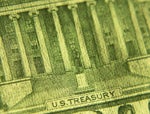Posted: June 7, 2011 9:20AM by Tim Begany

The U.S. government is a lot like a person in that it can borrow money. Unlike people, though, with the approval of Congress, the government can raise itsdebt ceiling - the most its legally allowed to owe - if it hits the current limit. That's sort of like you and I being able to automatically up our credit limit if we've maxed out our cards. (For more on the national debt, read A Look At Government Bonds And National Debt)
TUTORIAL: Economic Indicators
All sorts of funding crises would ensue if the government suddenly couldn't borrow. For example, the U.S. Treasury Department says the government wouldn't have enough money to pay employees, contractors or military personnel. Those are very large groups that contribute greatly to the economy, so not paying them could help tip the U.S. back into recession. Though undesirable, taking on more debt would delay immediate catastrophes like these, buying time for the government to straighten out its finances in an orderly fashion. (To learn more, check out Explaining The World Through Macroeconomic Analysis.)
Since the government relies heavily on borrowing to make payments on existing debts, raising the debt ceiling would prevent default on those payments. Not raising the ceiling would result in America's first default ever, and some leaders of the financial community believe that would be disastrous.
The Government Gets Off the Hook – Again
Being able to raise the debt ceiling almost at a whim obviously hasn't been much of an incentive for the government to balance the budget and get out of debt. Thus, some politicians, investors and economists argue that not raising the ceiling is now the only way to curb federal spending.
A higher ceiling only compounds a debt burden that's already unsustainable. If borrowing and spending are left unchecked, the government could owe $20 trillion, maybe more, by 2020. By then, interest payments alone could reach $800 billion a year.
Regardless of Congress's decision, the U.S. is in a tough spot financially. But things are still far from hopeless. The U.S. has escaped severe financial trouble before, like it did after World War II, when debt levels were even higher (as a percentage of GDP) than they are now. Back then, the national debt was an all-time high of 121% of GDP. Today, we're at about 100% of GDP. So the U.S. has been in worse jams, and there's still time to get out of this one. (For more, check out A Look At Government Bonds And National Debt.)
All information on this website is for educational purposes only and is not intended to provide financial advise. Any statements about profits or income, expressed or implied, does not represent a guarantee. Your actual trading may result in losses as no trading system is guaranteed. You accept full responsibilities for your actions, trades, profit or loss, and agree to hold MinKL Invest harmless in any and all ways.
No comments:
Post a Comment